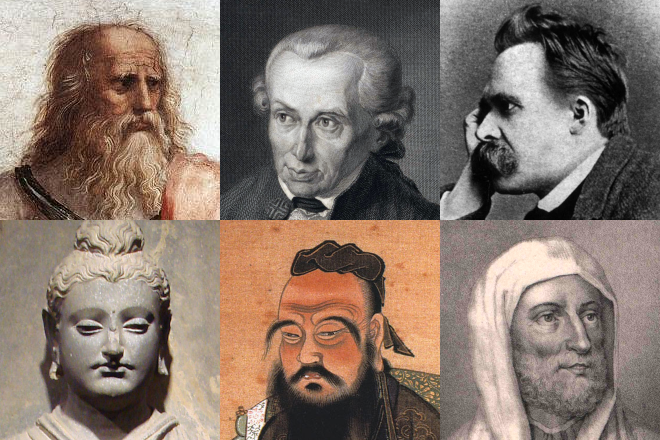Ancient Greek 101
- Introduction to Ancient Greek Culture
- Basics of Ancient Greek Language
- Ancient Greek Literature
- Basics of Ancient Greek Language II
- The Philosophers of Ancient Greece
- Intermediate Ancient Greek Language Practice
- The Birth of Democracy
- Intermediate Ancient Greek Language II
- Ancient Greek Mythology
- Advanced Ancient Greek Language
- Arts and Architecture in Ancient Greece
- Advanced Ancient Greek Language II
The Philosophers of Ancient Greece
Reflections on Eastern and Western Philosophies: A Comparative Study

Scholarly tradition of humanities in the Western world.
The philosophical traditions of the East and West have shaped the world in profound ways. This unit aims to explore the similarities and differences between these two philosophical traditions, focusing on Ancient Greek philosophy as representative of the West and Ancient Chinese philosophy as representative of the East.
Greek Philosophy
Greek philosophy, with its emphasis on reason and inquiry, has been a cornerstone of Western thought. The works of Socrates, Plato, and Aristotle, among others, have had a profound influence on various fields such as science, politics, and ethics. Greek philosophy is characterized by its pursuit of knowledge through rational thought and logical argumentation. It seeks to understand the world and human existence through critical thinking and philosophical debate.
Chinese Philosophy
Chinese philosophy, on the other hand, is deeply rooted in harmony, balance, and moral order. It is characterized by its emphasis on ethics, familial and social harmony, and balance in all things. Confucianism, Taoism, and Buddhism are the three main philosophical systems in China. Confucianism emphasizes social harmony and moral character, Taoism stresses living in harmony with the Tao (the natural order of the universe), and Buddhism, which was imported from India, focuses on the alleviation of suffering and the attainment of enlightenment.
Comparative Analysis
While both Greek and Chinese philosophies seek to understand the world and human existence, their approaches are markedly different. Greek philosophy tends to be more analytical and argumentative, focusing on logical reasoning and empirical evidence. Chinese philosophy, in contrast, is more intuitive and holistic, emphasizing harmony, balance, and moral order.
Despite these differences, there are also striking similarities. Both philosophical traditions emphasize the importance of virtue and ethics in personal conduct and social relations. They both seek to understand the nature of reality and human existence, and they both strive for a form of wisdom or enlightenment.
Influence on Modern World
Both Greek and Chinese philosophies have had a profound influence on their respective civilizations and on the world at large. Greek philosophy laid the groundwork for Western science, politics, and ethics, while Chinese philosophy has shaped Eastern views on harmony, balance, and social order. Today, as East and West increasingly interact and influence each other, understanding these philosophical traditions can help us appreciate the richness and diversity of human thought and culture.
In conclusion, while Greek and Chinese philosophies may differ in their approaches and emphases, they share a common goal: to understand the world and human existence, and to guide us in living a good and meaningful life. By studying these philosophies, we can gain a deeper understanding of our own philosophical heritage and open our minds to different ways of thinking and being.